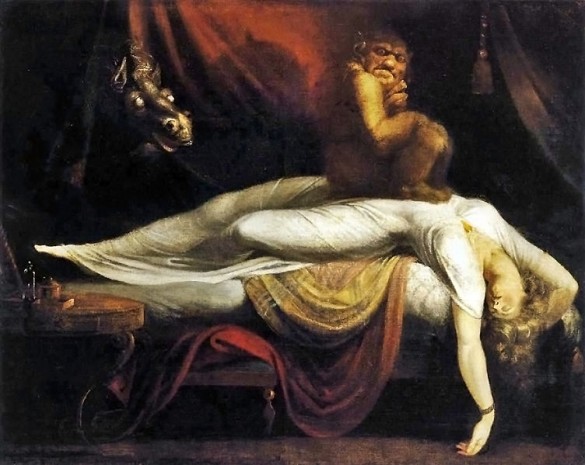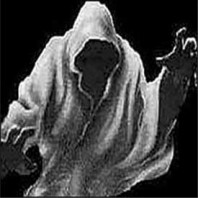
Sleep Paralysis is a troubling sleep condition that is deeply misunderstood in our culture. Experienced by millions as an incubus attack or being “ridden by a witch,” sleep paralysis (SP) has biological causes that are related to sleep hygiene, stress, and insomnia.
In SP, you are aware of the body’s paralysis that normally comes with REM (dreaming) sleep. This paralysis is what keeps us from acting out our dreams: a pretty important evolutionary skill that prevents us from injuring ourselves or our sleeping partners when we are dreaming about hunting tigers and bears.
This muscle paralysis is really frightening if you don’t know what is happening. It can feel like being pushed down into the bed, being suffocated, or like a heavy weight crushing down on the chest and throat.
And meanwhile, you feel like you are awake, with full thinking capabilities.
This is the original waking terror that inspired the word “nightmare” which is old Anglo-Saxon for “a crushing sensation at night.” The image above is Henry Fuseli’s Nightmare, painted in 1781, depicting an incubus demon sitting on a woman sufferer’s chest.
SP can also be a symptom of a more serious disorder, such as sleep apnea or narcolepsy. However, isolated sleep paralysis (ISP) is not a dangerous condition, despite how terrifying it seems at the time.
Sleep Paralysis visions have physical and emotional causes
About 20% of the time, ISP is accompanied by realistic, and often frightening, hallucinations. In my opinion, the underlying physical causes of ISP do not invalidate the psychological impact these visions can have on dreamers. Known as hypnagogic hallucinations (HH), these dreams are literally projected into the waking realm where we are laying down with open eyes. All over the world, across cultures and throughout recorded history, people have told tales of being sat upon by demons, ridden by witches, and haunted by spirits when they are in sleep paralysis.
A scientific worldview does not invalidate these claims, as medical historians and folklorists have argued for over 30 years. The night visitations of ghosts, monsters, vampires (and even aliens in many contemporary accounts) are psychologically real encounters, not simply stories that are fabricated because of a belief in ghosts and goblins.
In other words, the question is not whether or not if the demons are physically real, but whether or not they greatly affect the dreamer as an extraordinary experience.
Yes, they do.
These visions can be terrifying, and they can be equally life-changing.
Why demons won’t go away
 So how do we cope with nocturnal spirit attacks in the 21st century?
So how do we cope with nocturnal spirit attacks in the 21st century?
Sadly, many people do not share their experiences, for fear that they will be laughed at, or that they are losing their sanity. Others try to forget these hallucinations in the daylight of reason, but stay up late at night afraid to go to sleep.
This problem has affected me too, as someone who has suffered from isolated sleep paralysis with hypnagogic hallucinations (ISP/HH) for most of my life. In fact, one of the reasons why I studied dream research in grad school is because I needed to find away to face these lucid nightmares that were robbing me of sleep and negatively impacting my life.
In the last five years, I’ve freed myself from unwanted nightmares, thanks in part to my nightmare reseach and dreamwork, and also to a supportive community and family.
A Holistic Approach to Sleep Paralysis
My solution is an approach that treats sleep paralysis and the accompanying visions in a manner that respects the physical, mental, cultural and spiritual levels of the phenomenon. This holistic approach to ISP/HH allows us to untangle the various influences on the experience.
In this way, we can work with each “thread” to reduce the nightmares, lose the fear of the unknown, and start getting better rest again.
With time, these unique visions can also become a reliable gateway to other extraordinary states of consciousness, including lucid dreaming, out-of-body experiences, ancestral encounters, and guided journeys to realms beyond our imagination.
Free Download – The Report
To learn more about sleep paralysis, I invite you to download my free Sleep Paralysis Report. This 14 page report discusses the symptoms, causes and practical ways of managing sleep paralysis– such as how to wake up from sleep paralysis and how to prevent multiple occurrences in the same night.
Thus happens to me about three times a week and I didn’t know how to describe it to my family. It’s almost like web I’m going to bed I feel like I’m being chased and then I have to look around the whole room to see NOBODY IS THERE and I lay there breathing hard and I can’t fall asleep and when I do it feels like if I tried to get up, I couldn’t there was something there. It makes me scared to go to sleep.
I have suffered from Sleep Apnea and Sleep Paralysis since I was fifteen. I didn’t know then what it was, until I went to a doctor about it at the age of twenty-five. I was surprised by what my sleep study doctor told me after my results came in, but I was to apprehensive to use the mask for sleep apnea patients. Plus, my doctor looked at me (in my opinion) as a crazy person. I had recorded my encounters in detail, but it wasn’t easy explaining it to him. I see things, mostly a dark fingernail in my face, the sensation something is sitting on me. I hear voices telling me to come with them, and in my lucid state, I hear my own voice, distant, but I say no or I manage to kick my foot but in reality I am not moving. I can feel every sensation, some of them have been unwelcomed and have left me vulnerable. I use to just wake from REM to quickly and look around the room, but now I dream during it and everything around me questions reality. I thought I escaped from the paralysis and was running down the hall, but the hall started to move like in a fun house tunnel, and there was no sound save my voice. I woke up back in bed in the same position on my right side. I always sleep on my side, but the attacks have the most when I am lying that way. I just had four in a row today. My mouth is closed during this, so my breathing feels blocked and I almost forget to breath threw my nose.
Is sleep apnea and paralysis together really worse than having just ISP? I fear the results of having them together. My mom is the only person I know who suffers from it, but no one else in my family has this cursed condition. Any suggestions?